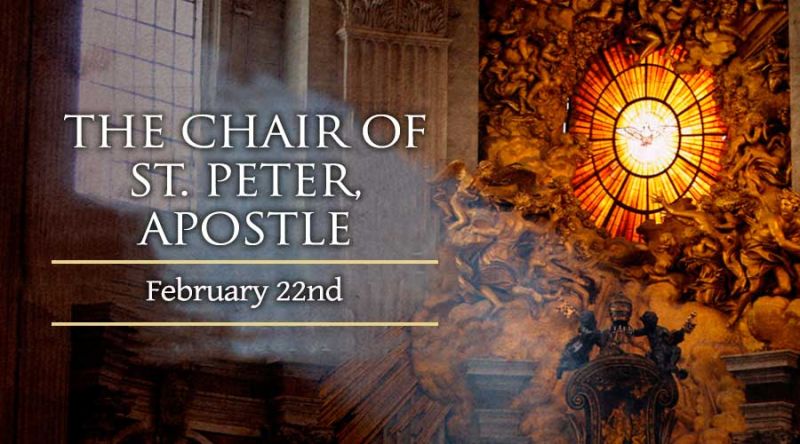Chair of Saint Peter

Chair of Saint Peter
Feast date: Feb 22
The Feast of the Chair of St. Peter celebrates the papacy and St. Peter as the first bishop of Rome. St. Peter’s original name was Simon. He was married with children and was living and working in Capernaum as a fisherman when Jesus called him to be one of the Twelve Apostles.
Jesus bestowed to Peter a special place among the Apostles. He was one of the three who were with Christ on special occasions, such as the Transfiguration of Christ and the Agony in the Garden of Gethsemane. He was the only Apostle to whom Christ appeared on the first day after the Resurrection. Peter, in turn, often spoke on behalf of the Apostles.
When Jesus asked the Apostles: “Whom do men say that the Son of Man is?”
Simon replied: “Thou art Christ, the Son of the Living God.”
And Jesus said: “Blessed are you, Simon Bar-Jona: because flesh and blood have not revealed it to you, but my Father who is in heaven. And I say to you: That you are Peter [Cephas, a rock], and upon this rock [Cephas] I will build my Church [ekklesian], and the gates of hell shall not prevail against it. And I will give to you the keys of the kingdom of heaven. And whatsoever you shall bind upon earth, it shall be bound also in heaven: and whatsoever you shall loose on earth, it shall be loosed also in heaven”. (Mt 16:13-20)
In saying this Jesus made St. Peter the head of the entire community of believers and placed the spiritual guidance of the faithful in St. Peter’s hands.
However, St. Peter was not without faults. He was rash and reproached often by Christ. He had fallen asleep in the Garden of Gethsemane instead of praying, as Jesus had asked him to do. He also denied knowing Jesus three times after Christ’s arrest.
Peter delivered the first public sermon after the Pentecost and won a large number of converts. He also performed many miracles and defended the freedom of the Apostles to preach the Gospels. He preached in Jerusalem, Judaea, and as far north as Syria.
He was arrested in Jerusalem under Herod Agrippa I, but miraculously escaped execution. He left Jerusalem and eventually went to Rome, where he preached during the last portion of his life. He was crucified there, head downwards, as he had desired to suffer, saying that he did not deserve to die as Christ had died.
The date of St. Peter’s death is not clear. Historians estimate he was executed between the years 64 and 68. His remains now rest beneath the altar of St. Peter’s Basilica in Rome.
